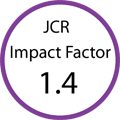The Hepatoprotective Effect of Vitamin A against Gasoline Vapor Toxicity in Rats
Abstract
Background: Changes in the activities of plasma alanine amino transferase (ALT), aspartate amino transferase (AST), gamma glutamyl transferase (GGT), and alkaline phosphatase (ALP) are used to assess the functional state of the liver. Significant increase in the activities of these enzymes commonly indicates the hepatotoxicity of chemical agent(s) in the body. Exposure of male and female rats to 17.8 cm3h-1m-3 of Premium Motor Spirit (PMS) blend unleaded gasoline (UG) vapors for 6 hr/day, 5 days/week for 20 weeks have been observed to cause hepatotoxicity. In this study, the potential hepatoprotective effect of vitamin A (retinol) against gasoline vapours-induced toxicity was investigated in male and female rats.
Methods: Retinol (400 IU/kg/day) was orally administered to the test rats concomitant with the gasoline vapor exposure in the last two weeks of the experiment.
Results: The results obtained from this study showed that exposure to gasoline vapors caused significant increase (P < 0.05) in the activities of serum ALT, AST, ALP, GGT and bilirubin in both male and female rats. The treatment of the male and female test rats with vitamin A produced a significant decrease (P < 0.05) in the activities of these parameters, compared with the test rats without treatment; but insignificant increase(P >= 0.05), compared with the control.
Conclusions: The result of this study demonstrates the beneficial effects of retinol, at prophylactic dosage, against gasoline vapours hepatotoxicity in male and female rats, thereby suggesting that retinol may be used to prevent hepatotoxicity in individuals frequently exposed to gasoline vapours.
Gastroenterol Res. 2009;2(3):162-167
doi: https://doi.org/10.4021/gr2009.06.1297
Methods: Retinol (400 IU/kg/day) was orally administered to the test rats concomitant with the gasoline vapor exposure in the last two weeks of the experiment.
Results: The results obtained from this study showed that exposure to gasoline vapors caused significant increase (P < 0.05) in the activities of serum ALT, AST, ALP, GGT and bilirubin in both male and female rats. The treatment of the male and female test rats with vitamin A produced a significant decrease (P < 0.05) in the activities of these parameters, compared with the test rats without treatment; but insignificant increase(P >= 0.05), compared with the control.
Conclusions: The result of this study demonstrates the beneficial effects of retinol, at prophylactic dosage, against gasoline vapours hepatotoxicity in male and female rats, thereby suggesting that retinol may be used to prevent hepatotoxicity in individuals frequently exposed to gasoline vapours.
Gastroenterol Res. 2009;2(3):162-167
doi: https://doi.org/10.4021/gr2009.06.1297
Publish ahead of print June 16, 2009
Keywords
Hepatoprotective; Gasoline vapours; Retinol; Aminotransferases; Bilirubin




